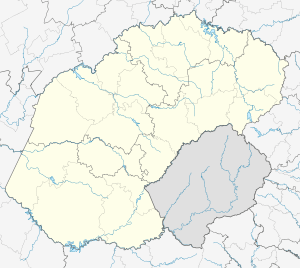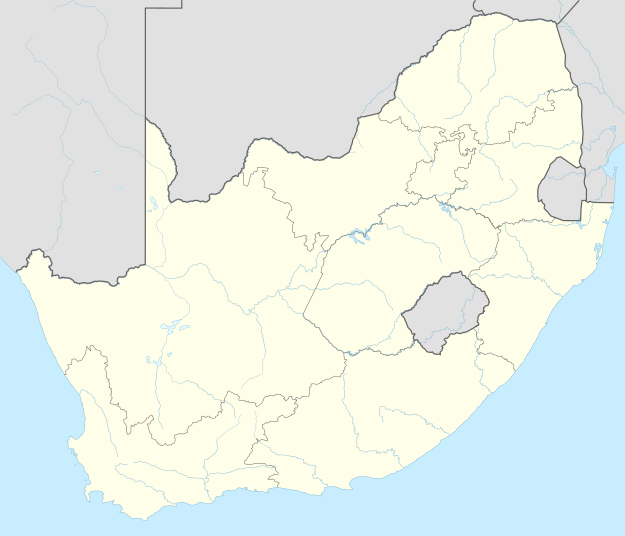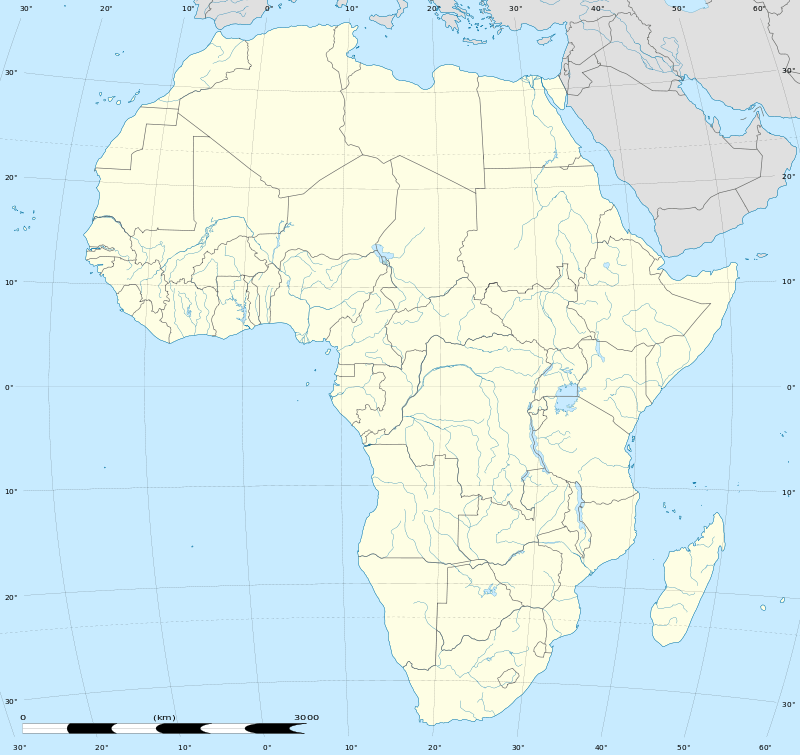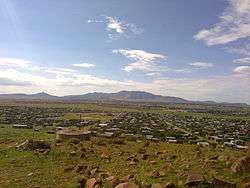Thaba 'Nchu
| Thaba 'Nchu | |
|---|---|
|
Thaba 'Nchu | |
 Thaba 'Nchu  Thaba 'Nchu  Thaba 'Nchu
| |
| Coordinates: 29°12′S 26°50′E / 29.200°S 26.833°ECoordinates: 29°12′S 26°50′E / 29.200°S 26.833°E | |
| Country | South Africa |
| Province | Free State |
| Municipality | Mangaung |
| Established | 1892[1] |
| Area[2] | |
| • Total | 36.39 km2 (14.05 sq mi) |
| Population (2011)[2] | |
| • Total | 70,118 |
| • Density | 1,900/km2 (5,000/sq mi) |
| Racial makeup (2011)[2] | |
| • Black African | 98.9% |
| • Coloured | 0.4% |
| • Indian/Asian | 0.3% |
| • White | 0.2% |
| • Other | 0.2% |
| First languages (2011)[2] | |
| • Sotho | 46.8% |
| • Tswana | 40.1% |
| • English | 3.9% |
| • Xhosa | 3.8% |
| • Other | 5.5% |
| Postal code (street) | 9780 |
| Area code | 051 |
_-_Copy.jpg)
Thaba 'Nchu is a town in Free State, South Africa, located 60 km east of Bloemfontein and 17km east of Botshabelo. The population is largely made up of Tswana and Sotho people. The town was settled in the 1830s and officially established in 1873. The town grew larger following the 1913 Natives' Land Act that stated Thaba 'Nchu as a homeland for Tswana people. It was known among the Voortrekkers as Blesberg (blazed mountain, bald mountain).[4]
History
Moroka II, chief of the Boo-Seleka section of the Barolong, migrated here in 1833. A decade earlier his clan was driven from their land of origin, over the Vaal, by Mzilikazi, and sojourned at Motlhanapitse, in what is now the western Free State. Upon reaching an agreement with king Moshoeshoe I, they settled at Thaba 'Nchu, where their numbers were augmented by other Barolong scattered by Mzilikazi.[5]
These Batswana people accepted the Voortrekkers as allies. The first Voortrekkers to stay here on their northward journeys were Louis Tregardt and Hans van Rensburg. Thaba 'Nchu subsequently became a safe meeting place for leaders such as Hendrik Potgieter, Piet Uys and Gerrit Maritz.
After Potgieter's trek was attacked and plundered at Vegkop, Moroka II swiftly assisted him with draught oxen and a liberal provision of supplies.[5] The Boer party was also assisted in returning to a refugee camp at Thaba 'Nchu, named "Moroka's Hoek". The Boer leader held a war council with the Barolong chiefs, Moroka and Tauana, where a Boer-Barolong-Griqua allegiance was formed, which shortly routed Mzilikazi, who then founded the kingdom of Matabeleland.[5]
Thaba 'Nchu was considered a friendly native state of the boer-governed Orange Free State, established in 1854. It however became an insular territory during the Basotho Wars, during which the Basotho were expelled from its vicinity.[5]
In the apartheid era it formed part of the area set aside for the bantustan of Bophuthatswana, nominally ruled by the then President Lucas Mangope. It was then a trading centre. Following the establishment of a hotel and casino by Sun International during that time it has become a major tourist attraction in the Free State, due to its proximity to Bloemfontein.
Geography
Geographical features include the promontories of the Lesotho mountains, suitable for large lands with ample game, wherein a game reserve, the Maria Moroka Game Reserve, has been maintained. A variety of wildlife and bird species are found here, besides a hiking trail, a traditional Tswana site, and amenities for various activities and adventures in the reserve. The reserve has been named after the political town hero Dr. Maria Moroka. Much of the surrounding land is arable, which has been employed for large scale farming of both commercial and domestic nature. The town is also known for the Aran hand-knitted woolen garments made by local craftspeople.
Politics
The town is still closely governed by His Majesty Chief Albert Moroka. He is still responsible for most civil matters and he is still the judge at the tribal court, so the town is still has a very traditional feel despite having a proper court of law and falling under the Mangaung local municipality. It has a very dry and cold winter with periodically wet summers.
See also
References
- ↑ "Chronological order of town establishment in South Africa based on Floyd (1960:20-26)" (PDF). pp. xlv–lii.
- 1 2 3 4 "Main Place Thaba 'Nchu". Census 2011.
- ↑ "Thaba-Unchu" (PDF). The Wesleyan Juvenile Offering: A Miscellany of Missionary Information for Young Persons. Wesleyan Missionary Society. IX: 10. January 1852. Retrieved 24 February 2016.
- ↑ Raper, Peter E. (1987). Dictionary of Southern African Place Names. Internet Archive. p. 80. Retrieved 28 August 2013.
- 1 2 3 4 Plaatje, Sol T. (1916). "Chapter VIII, At Thaba Ncho: A Secretarial Fiasco". Native Life in South Africa.

.svg.png)